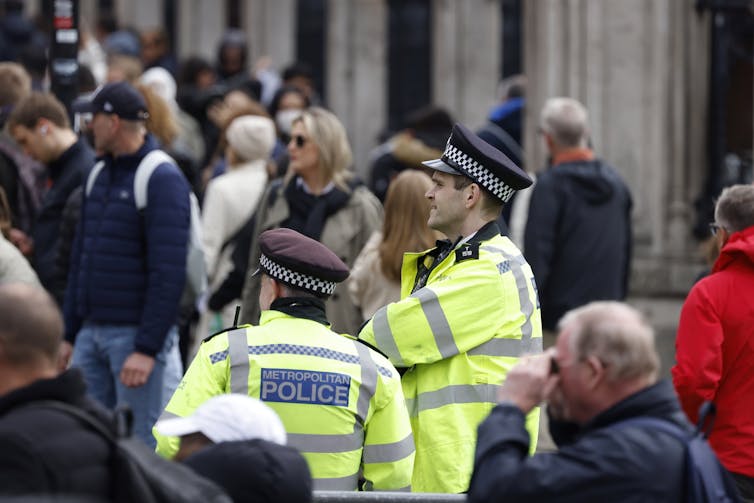Police in England and Wales are facing a crisis of confidence. In the wake of cases including the Charing Cross scandal, the murder of Sarah Everard at the hands of off-duty Metropolitan Police constable Wayne Couzens and former police officer and serial rapist David Carrick, public trust in police has completely broken down.
Another is the failure of police to solve crimes. Between 2015 and 2023 in England and Wales the percentage of crime resulting in the offender being caught by the police and taken to court fell from 16% to 5.7%. For rape, it is around 2% of reported rapes cases that result in the Crown Prosecution Service charging a suspect and taking them to court.
The question then is whether either of the main parties is up to the immense challenge of rebuilding trust. The Conservatives have promised to recruit 8,000 more police officers “to patrol communities and catch criminals in every ward in the country”. Labour is similarly focused on recruitment, and, critically, aims to improve police crime investigation.

Want more election coverage from The Conversation’s academic experts? Over the coming weeks, we’ll bring you informed analysis of developments in the campaign and we’ll fact check the claims being made.
Sign up for our new, weekly election newsletter, delivered every Friday throughout the campaign and beyond.
The Conservatives’ plan to boost recruitment
Under austerity, police forces in England and Wales were forced to reduce their workforce numbers. From 2010 to 2019 this caused a reduction of 21,363.
Recent Conservative governments since 2019 have increased the basic number of officers, bringing them back to 2010 pre-austerity levels. But the problem now is that police are experiencing the highest-ever rate of voluntary resignations.
Research published in May 2023 shows that many recruits didn’t really know enough about how being a police officer would affect them emotionally, their social and home life. This meant they became disillusioned quite quickly and left.
As a result, over a third of officers in 2023 now have below five years of service, up from 31% in 2022. There are simply not enough officers trained and experienced in solving crimes.
Forcing through rapid recruitment without adequate vetting and checks, just to satisfy political targets, does not help retain good officers who are likely to make a career out of policing and become experienced crime fighters.
Read more: Police officer resignations have risen by 72% in the last year – we asked former officers why
The Tories promise another 8,000 police, and that isn’t to be sniffed at. Stipulating that there will be a “neighbourhood” officer in every ward, though, shows a lack of understanding of how police forces function.
Police forces do not necessarily use electoral wards for operational policing deployment. Depending on need, a neighbourhood team may be assigned to a much smaller area (a single housing estate or a few streets) or a larger one, covering three or four electoral wards. Chief constables decide where officers are best placed. The idea that central government could or should dictate this is not feasible.
The nostalgic concept of “bobbies on the beat” may appeal to older voters, but it has no measurable effect on actual crime-fighting policing. Neighbourhood or response police officers are not dealing with the low-level crime which they would have done 20 years ago. The police fail to even attend, let alone investigate, many of the most common crimes. Shortages of officers means they have become deskilled and are rushing from job to job.
There is some evidence that neighbourhood police can help improve public confidence in the police and reduce public perception of disorder. But this is different from actually reducing it. The police themselves do not claim that neighbourhood police officers are there to solve crimes.
The Conservatives also aim to strengthen police powers for protests, which will require more officers. But the officers holding riot shields at marches are not dedicated riot police. They are just regular patrol and neighbourhood officers who could otherwise be doing neighbourhood policing. The more laws created that require the police to arrest people who are protesting, the fewer officers are available for other types of police work. It’s all about priorities.

The most helpful thing proposed is the Conservatives’ plan to address misconduct by improving vetting processes. I have written before about how these need reform. But this doesn’t need to be legislated.
If a chief constable needs to be forced by law to vet their staff, they are probably not suitable for that role anyway. Rather, the Home Office, chief inspectorate and the National Police Chiefs’ Council should work together on an intrusive vetting regime to be adopted by all forces, and this seems to be Labour’s proposal.
Labour’s plan to improve crime investigation
Labour also wants to recruit thousands of new police officers and support neighbourhood policing, but unlike the Conservatives, they are not promising to stipulate where these officers are placed.
Labour’s focus will instead be on tackling anti-social behaviour, which is more in line with their intended problem-solving role.
Labour’s rhetoric on solving crime looks promising. At the moment, if you have a bike stolen or your fence is kicked down, you are unlikely to see a police officer. If you even bother to report it the police will just give you a crime number for your insurance company and tell you they do not investigate such crimes.
It is not a serious proposition for Labour to imply the police should attend every call and thoroughly investigate every crime: that hasn’t been the case for decades and can safely be ignored.
However, Labour does seem serious about improving the investigation and detection of more serious crimes, including burglary, rape and domestic abuse.
Rape investigation is one of the disasters in the current criminal justice system. The Labour manifesto has the interesting observation: “Rather than working together, police and prosecutors often engage in a blame game, which lets down victims.”
One big reason why so many rapists get away with their crime is the breakdown in communication between police and the Crown Prosecution Service.
Frustratingly, however, much of Labour’s talk so far on rape has been about specialist courts. Indeed, it is a manifesto pledge to “fast-track rape cases, with specialist courts at every Crown Court location in England and Wales”.
It is important for victims to see their case in court quickly, but we currently have a situation in England and Wales whereby hardly any rape cases are reaching court at all. Most of the attrition in rape cases occurs while the police are investigating. Only about 5% of cases are even sent to the Crown Prosecution Services asking for a charging decision.
Labour have also announced they will create a direct entry detective scheme. Such a scheme has been in existence for several years in some police forces, including the Met. But, as there is little doubt that the police need to dramatically improve their ability to investigate and detect crime, Labour seems to be pushing the right buttons.

